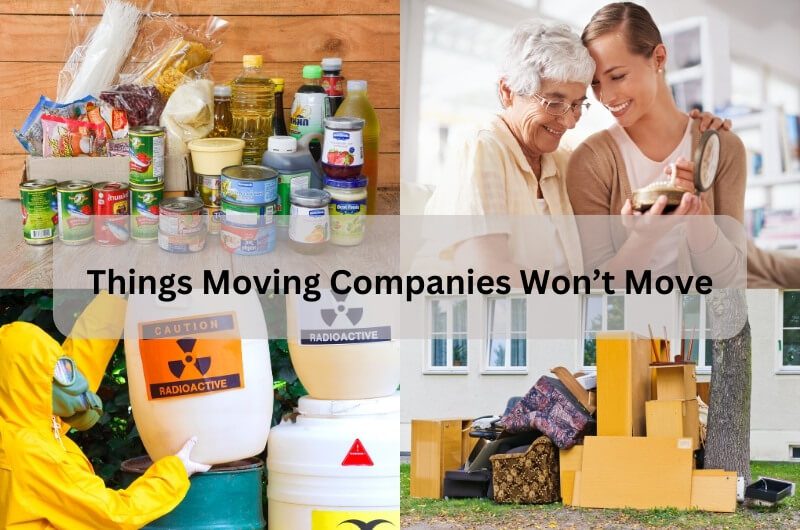Time to move? Amidst the whirlwind of packing and unpacking, knowing that not everything makes the journey with you is essential. From cherished heirlooms to hazardous materials, there’s a world of items that moving companies won’t move.
We’re here to guide you through this adventure, shedding light on what to leave behind and how to handle those precious pieces that require a special touch.
Let’s look into the things moving companies will simply not move.
1. Perishable Items
Since you are preparing for your upcoming move, we recommend diving into the fridge and enjoying the leftovers. Moving companies do not transport any food or other perishable products. So, you should either finish leftovers like milk and yogurt or just throw them away.
The moving company can move the other non-opened food items, such as canned and packeted food. They need to be adequately packaged and labeled.
In case you don’t have any room left to take them with you, consider donating them. It will be a kind gesture that may help families out there struggling.
Many organizations would gladly take in food and share it with fellow citizens. Alternatively, you can also find out if your community has any food banks to donate to.
2. Items with Sentimental Value
Certain items hold sentimental value to the family. These can include family heirlooms, other valuables, and personal documents. You are responsible for these items.
There may be many companies that would outrightly deny taking high-value items, simply because there is always the possibility of causing damage to them.
Although there’s a mover’s liability coverage, no amount of money can replace an object with sentimental value. Thus, taking personal responsibility and carrying these items with you is advised.
3. Expensive Items
All the best moving companies provide different kinds of liability coverage. For items that require better protection, Full Value Protection is provided.
One caveat, however, is that most moving companies can limit their legal responsibility. Thus, it is better to take personal responsibility for items with high market value, such as cash, jewelry, antique items, and artwork.
4. Items with Legal Restrictions
The next thing to understand is that there are specific legal restrictions on movers’ movement of certain prohibited or illegal substances.
Most moving companies would not transport items like explosives, firearms, ammunition, and certain controlled substances.
Whenever moving, it is important to research local, state, and federal laws and to strictly adhere to them.
5. Hazardous Materials
If you store any potentially dangerous or harmful materials within your household, it’s strongly advised that you take the necessary steps to dispose of them properly.
Disposing of them will not only help ensure the safety of yourself and those around you, but it will also assist in maintaining a clean and hazard-free environment for all.
Some common hazardous materials are:
- Paints and solvents that contain harmful materials such as lead and volatile organic compounds (VOC).
- Flammable liquids
- Gasoline or propane tanks
- Batteries
- Prescription medication that you no longer require
- Chemicals and cleaning agents
6. Oversized and Bulky Items
If you have any large or heavy items (such as pianos or safes), you should discuss them with your moving company. Moving large and heavy items can be quite challenging due to their size and weight.
Make sure to use a good moving cost calculator to estimate the additional price that you’ll need to pay. When choosing a full-service moving company, prioritize those capable of moving heavy items to save time and money.
7. Pets
Moving companies do not consider your pet (small or big) for transport. There are simply too many challenges associated with moving live animals. For starters, moving companies carry items in a truck.
Items are liable to sudden movements and challenging airtight environments. It is simply not healthy for any living pet to be transported in such a way.
If you have opted for long distance movers and find it difficult to carry your pet all by yourself, you can also consider contacting a pet relocation service.
8. Plants
It’s essential to keep in mind the legal requirements when it comes to moving plants, especially across state lines.
The Department of Agriculture does put certain restrictions on specific plant species for inter-state transportation.
If you’re not sure about what plants you can or can’t move with you, feel free to contact the State Plant Regulatory Official (SPRO) in the state you are moving to.
9. Alcoholic Beverages
Packaging your liquor collection with the movers on trucks can be tricky for many reasons. Firstly, they are fragile and might break without proper attention and care. Secondly, They are flammable, creating an extra risk.
If you have just a few liquor bottles, you can carry them with you or donate them. If you have a more extensive and more expensive collection of wine bottles, consider contacting a wine relocation company, which is a much safer option.
FAQs
Can I pack and move those restricted items myself?
You can personally transport restricted items that moving companies won’t handle. It’s advisable to research guidelines and regulations regarding the transportation of such items, especially for hazardous materials and valuables. Taking irreplaceable items or items of sentimental value with you during the move is often the best choice.
Are there alternatives for moving valuable items like expensive antique artwork or jewelry?
Yes, there are alternatives. Consider using specialized moving services, purchasing additional insurance coverage, or transporting these items yourself.
What happens if I accidentally pack restricted items with my other items?
If a restricted item is packed by mistake with the other items, the moving company might discover it during the move. They will likely inform you and discuss appropriate actions, including removing the item from the shipment or arranging proper disposal. It’s best to be transparent and communicate with the moving company if you have packed a restricted item.
Should you opt for Full Value Protection (FVP) coverage?
Opting for Full Value Protection coverage should be considered. While it offers comprehensive protection for lost or damaged items based on their value, the cost might be high. For smaller, sentimental items, personal care might be more suitable. For substantial possessions like furniture, Full Value Protection could be worthwhile.
Can I transport my garden equipment and tools?
Garden equipment and tools that don’t contain hazardous materials are usually safe to pack. Make sure to empty the fuel from lawnmowers and other machinery to prevent leaks during transit. If you’re unsure, check with your moving company for their guidelines on transporting these items.
Navigating Challenges: Understanding What Your Moving Company Won't Move
In conclusion, recognizing the range of items moving companies decline to transport is essential for a successful relocation endeavor. While these companies offer convenience, regulatory restrictions, and safety concerns exclude certain items from their services. This awareness empowers you to make informed decisions regarding the secure transportation of your belongings.
Whether dealing with hazardous materials, perishable goods, sentimental valuables, or items of personal significance, understanding these limitations allows for efficient decision-making.
Exploring alternative options like specialized carriers or personal transport contributes to the smooth delivery of each possession to its new destination.
Ultimately, through careful consideration and effective communication, a well-prepared approach ensures a successful transition to your new chapter.



